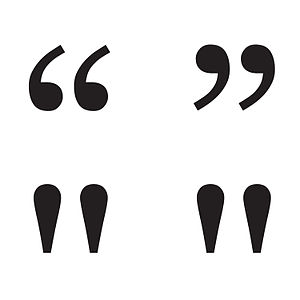 |
| Typographic quotation marks (top) versus straight quotation marks, or "dumb quotes" (bottom). (Photo credit: Wikipedia) |
If you’re a writer, you’ll understand my frustration at the multitude of
different formats we’re required to adopt in presenting our work to various
different organisations, I’m sure. You may even share it.
You write a story and want to send it to a British magazine. So: wide
margins, double spaced lines, double, curly quotes for speech, indented
paragraphs without space between, a standard proportional font like Times New
Roman or Ariel, and, of course, British English spelling and idiom. The latter
two are understandable; though, more on that later.
You then decide to send it to an American magazine. So: wide margins,
double spaced lines, single, straight quotes for speech, no indents for
paragraphs, but each separated by a line space, a non-proportional font like
Courier, which makes the piece look as though it’s been produced on an
old-fashioned typewriter, and, depending on editorial policy, either your original
or American spelling and idiom.
Next, you wish to produce it as an ebook. So: strip out all formatting,
reduce margins, single line spacing, use straight quotes and avoid any
‘special’ characters, paragraph formatting again requires an indent, but a
smaller one than for the printed text, and a proportional font again. Here,
it’s a personal choice which linguistic idiosyncrasies you choose to adopt,
though consistency throughout the work is advisable, of course.
These are just three of the varied styles we’re required to adopt. There
are many small variations, dependent on the house style of the publication
chosen. And, as the writers, we’re expected to adapt to each individual set of
requirements. The fact that we are the creators, the originators, of the
material is immaterial as far as the publications are concerned. It is we who
have adapt to their specific peculiarities.
Almost without exception, the reasons for these idiosyncrasies of
presentation are based on simple tradition. The publishers have always done it
this way; therefore, that is the ‘right’ way for it to be done. I’ve argued, in
a previous post, that tradition is not always a good thing. In fact, it can
frequently be a very bad thing. It’s tradition, after all, that maintains the
custom, prevalent amongst certain ill-educated and socially backward clans, of
violating their women by the horrendous imposition of female circumcision. I
doubt there’s a single modern individual who would uphold such a tradition.
Is there, in reality, any reason why there should not be a single,
straightforward style of presentation that could be used for all manuscripts
submitted to journals, publishers and ebook producers? I can think of no
technical reason. The oddities of ebook formatting requirements are largely
down to lazy and/or non-standard software programming; something that could so
easily be changed. Such standardisation would be of benefit to readers as well,
since it would make it very straightforward for them to read their purchased
books on any given ereader.
All the individual publishers, publishing organisations, national bodies
and organisations would no doubt come up with reasons why their particular style
should be the one adopted, of course. Such is the nature of tradition and
habit. But such objections could be negotiated into a sensible solution and, in
reality, once a standard form of presentation was adopted, users would very
quickly become familiar with it. We, the writers, the creators, the
originators, would then be left free to get on with our job of making instead
of having to mess around with all the variations we’re currently required to
deal with.
The linguistic elements I alluded to earlier represent a more difficult
area of change. However, it’s clear from current developments that English will
be the language most widely spoken (and, perhaps, written) for the foreseeable
future. Perhaps, instead of allowing it to deteriorate organically into the
more or less incomprehensible Panglish that is the predicted outcome, we should
organise ourselves into a guiding role and consciously modify the language to
make it more understandable by the majority? Clearly, the use of phonetic
spelling would help non-native speakers to learn and use the language; a plus
in the spread of our means of communication. There will always be a need for
irregulars, of course. But, surely, we could determine that plow is a more
sensible version than plough. I’d even argue for the more sensible thru to
replace through.
I know the purists will hate the very idea. But we live in a world with a
growing population and shrinking borders. Surely it makes sense to help our
decedents get along with each other and remove one of the many barriers to
cooperation and mutual understanding. It’s been said, with some justification,
that wars have been started because of linguistic misunderstandings. Let’s
actually do something to avoid future incomprehension rather than allow events
and tradition to dictate ever increasing chaos in our methods of communication.
Language is how we swap ideas. Let’s work to make the exchange easier, rather
than increasingly difficult.
Or am I being idealistic here? What do you think?



No comments:
Post a Comment